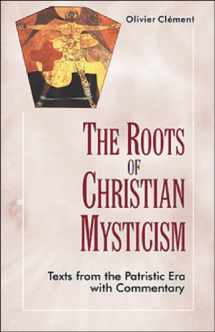
Roots of Christian Mysticism: Texts from Patristic Era with Commentary
Book details
Summary
Description
Some books on mysticism offer New Age syncretism. Others propose simplistic methods of producing spiritual experiences. Still others deconstruct religious experience. The Roots of Christian Mysticism by Oliver Clement, however, avoids these pitfalls.
Clement presents the mysticism of the early fathers themselves, from whose writings he offers exceptionally rich selections that are not readily available. In so doing, he introduces the reader to Christian mysticism through the words of those who were “drunk with God,” but whose religious experience was firmly rooted in Christ.
Most importantly, given the modern propensity for bogus spirituality, Clement shows the indissoluble unity between mysticism and doctrine. The Fathers speak doctrine in voices radiant with the dark vision of God and their doctrine is both the fruit of prayer and the form of spirituality. From this perspective, the Church’s teachings about God, Christ, Church, Sacrament and Christian vocation become the objects of contemplation and the personal quest for God finds its way within, not apart from the Church, ecclesia. Christian mysticism, therefore, always occurs within the womb of the Church, particularly within the locus of the liturgy and thus, is prevented at the outset from becoming merely a freewheeling and self-authenticating form of emotional exuberance.
Mysticism, thus firmly rooted, is considered the normal spiritual life of all Christians. All the faithful are called to realize fully the grace of their baptism, that is, to fulfill their humanity by being divinized through grace. These words might be disconcerting or raise the specter of “enthusiasm,” but some proper understanding of this calling, however embryonic, is indispensable to spiritual growth, to the life of the Church and to the transformation of culture.
Why, for example, when so many Americans claim to be Christian does their faith have so little impact on our culture? Or why are the Church’s moral teachings found to be so excessively burdensome? Perhaps Christians have seldom been directed toward a spirituality that would open them to a fuller vision of their true destiny in Christ. A recent classroom experience illustrates the point. A young Christian father of two vigorously proposed many practical reasons for using contraception. His understanding of fatherhood operated on a purely naturalistic level; his concern to provide for his children likewise revolved around material goods. But once he glimpsed the ultimate destiny in Christ to which he and his children were called, he saw his fatherhood as a participation in a sacred mission and trust. Only then did the Church’s teaching and the sacrifices it entails make sense enough to follow.
Such illumination is an essential component in the birth of mystical life from which, for the fathers, the moral life flows. To use Clement’s terms, “only when the beauty-goodness of the truth captures the spirit-heart is the person able to engage in Christian praxis and to make the sacrifices necessary not merely to be good but to be transformed into Christ.”
This transformation entails strenuous spiritual combat with a fallen human nature that the Fathers understand with exquisite perception. But even here the patristic thrust is basically positive, an attraction to the beauty and goodness of God that calls forth virtue, rather than an emphasis on the direct destruction of sin. Clement aptly describes asceticism as “an awakening from the sleep-walking of daily life. It enables the Word to clear the silt away in the depth of the soul, freeing the spring of living waters.... It is the Word who acts but we have to co-operate with him, not so much be exertion of will-power as by loving attentiveness.”
Although spiritual growth naturally encompasses the activities of prayer, fasting and so forth. Clement never discusses this apart from Christ and Trinity. Salvation is not achieved through Pelagian self-development but in Christ and through his Church. The Fathers’ theological center prevents their mysticism from collapsing into self-centered or naturalistic forms. The beauty that attracts is never separated from her sisters truth and goodness.
The Roots of Christian Mysticism needs to be read by Christians seeking spiritual depth and by anyone wanting to taste doctrine as a living word. It is an excellent introduction to patristic thought and offers not only extensive selections of their writings but an appendix of about seventy pages of biographical material. Only one criticism of the book is offered: references to modern writers need to be noted so the reader can pursue them. Otherwise, this book is a gem.
Jerrilyn Szelle
Crisis
April, 1996


We would LOVE it if you could help us and other readers by reviewing the book
Book review



